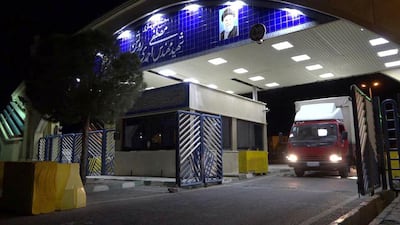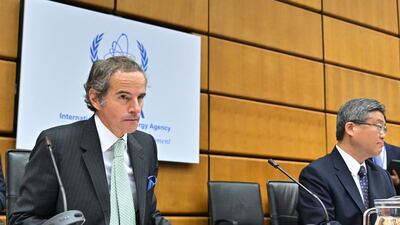The UN nuclear watchdog's 35-nation board of governors has overwhelmingly passed a resolution criticising Iran for a lack of co-operation with the UN nuclear inspectorate, diplomats said on Wednesday.
Only two countries, Russia and China, opposed the text, while 30 voted in favour and three abstained, the diplomats told AFP.
The text says the board "expresses profound concern" that the uranium traces found at three undeclared sites remain unexplained due to insufficient co-operation by Iran, and calls on Tehran to engage with the watchdog "without delay".
The motion was submitted by the US, Britain, France and Germany to the International Atomic Energy Agency to censure Iran over its lack of co-operation.
It comes after Tehran turned off two cameras that the UN watchdog used to monitor one of the country's atomic sites.
An Iranian state TV report did not identify the site where the cameras had been switched off.
"So far, the IAEA has not only been ungrateful for Iran's extensive co-operation, but has also considered it as a duty," state TV said.
"From today, relevant authorities have ordered that surveillance cameras of the online enrichment monitor be shut down."
The resolution urging Iran to co-operate fully with the IAEA is the first since June 2020, when a similar motion censuring Iran was adopted.
It is a sign of growing western impatience after talks to revive the 2015 landmark nuclear accord with Iran stalled in March.
In a statement to the IAEA's board of governors, which meets this week, Britain, France and Germany said they "strongly urge Iran to stop escalating its nuclear programme and to urgently conclude [the] deal that is on the table".
"Its nuclear programme is now more advanced than at any point in the past," they said.
They said Iran's accumulation of enriched uranium has no "credible civilian justification".
Iran has always denied wanting to develop a nuclear weapon.
According to the latest IAEA report, the country now has 43.1 kilograms of 60 per cent-enriched uranium.
IAEA Director General Rafael Grossi said on Monday it would be "a matter of just a few weeks" before Iran could obtain sufficient material needed for a nuclear weapon if it continued to develop its programme.
The IAEA said in its report last month that it still had questions that were "not clarified" regarding traces of enriched uranium found at three sites that Iran had not declared as being used for nuclear activity.

Iranian Foreign Ministry spokesman Saeed Khatibzadeh told state TV on Monday that Iran would reject the resolution, which would have "a negative impact both on the general direction of our co-operation with the IAEA and on our negotiations".
China and Russia, which with the UK, France and Germany are parties to the Iran nuclear deal, have said any resolution could disrupt the negotiation process.
Analysts say the high-stake negotiations are unlikely to fall apart because of the resolution.
There are two parallel but closely interwoven processes at play, Naysan Rafati, a senior Iran analyst at the International Crisis Group, told The National on Tuesday.
The first is negotiations on restoring the 2015 nuclear deal to address Iran's present and future nuclear activity; and second, the IAEA protecting investigations to resolve questions about past work at undeclared sites.
"The latter has been inconclusively running along for a few years, and in March, while the talks in Vienna were trying to move toward conclusion, Tehran again committed to addressing the agency's concerns," Mr Rafati said.
- News agencies contributed to this report.

